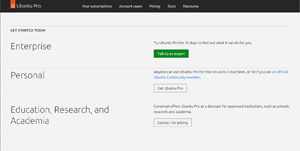In-Depth
A Free Enterprise OS with 10 Years of Support
Ubuntu is one of the most popular Linux distributions available. It was first released in 2004 and has proven innovative and rock-solid over the past 20 years. It offers free server and desktop OS downloads that have become the go-to Linux distributions for many companies and personal users.
Ubuntu offers Pro versions of their OSes with long-term support (LTS). They are serious about long term with a market-leading 10 years of support. Furthermore, they offer the Ubuntu Pro version to anyone for free on up to five machines, or 50 if they become an official Ubuntu Community member. From what I can tell, they do not restrict using these for commercial purposes.
 [Click on image for larger view.]
[Click on image for larger view.]
This is a huge boon to both individual users and small businesses.
This support includes security maintenance (ESM), which covers not only the OS but thousands of applications that run on it. This ensures that you will receive timely security patches for critical vulnerabilities during the LTS period, providing peace of mind for users who rely on their systems for long-term projects, or like me who tend keep running an OS far longer than I should.
It comes with other enterprise features as well, including FIPS 140-2 certified cryptographic packages, essential for compliance with stringent security standards in various industries such as finance, healthcare and government. Additionally, it supports compliance with standards like GDPR, HIPAA and PCI-DSS. These ensure that users can maintain high security and compliance levels without incurring extra costs, which is particularly beneficial for small organizations with limited budgets.
Kernel patching is usually problematic as it requires downtime. But Ubuntu Pro comes with live kernel patching, which allows the kernel to be updated without rebooting the systems, ensuring continuous uptime. This feature is invaluable for businesses that operate 24/7 or for users who cannot afford interruptions in their workflows. Live patching enhances the reliability and availability of systems, making Ubuntu Pro an excellent choice for environments where stability and uptime are paramount.
Pro users have access to technical support and resources that cover the OS and the open-source applications that run on it. This support is crucial for troubleshooting and optimizing system performance. This allows you to quickly resolve issues by leveraging Ubuntu experts. This is huge as support for "free" or "personal" tiers of software is usually reserved for paid enterprise subscriptions, making the free offer for your five or 50 systems particularly generous.
In the past, I have found Ubuntu's ease of use and integration capabilities outstanding. The platform is designed to be user friendly, with a straightforward setup process and intuitive management tools. It integrates seamlessly with existing infrastructure and supports a wide range of hardware and software environments.
Finally, I need to comment on the community and ecosystem surrounding Ubuntu, as I have found them extremely helpful. As one of the most popular Linux distributions, Ubuntu has a large and active user base. Over the years, this community has provided me with a wealth of resources, including forums, documentation and third-party tools. Users freely share knowledge, fostering a collaborative environment that can lead to innovative solutions. The strong community support, combined with the professional backing of Canonical, makes Ubuntu Pro a comprehensive and reliable choice for users looking to leverage the power of open-source technology. Did I mention that it is free?
For more information on the Ubuntu Pro free program, click here.
About the Author
Tom Fenton has a wealth of hands-on IT experience gained over the past 30 years in a variety of technologies, with the past 20 years focusing on virtualization and storage. He previously worked as a Technical Marketing Manager for ControlUp. He also previously worked at VMware in Staff and Senior level positions. He has also worked as a Senior Validation Engineer with The Taneja Group, where he headed the Validation Service Lab and was instrumental in starting up its vSphere Virtual Volumes practice. He's on X @vDoppler.